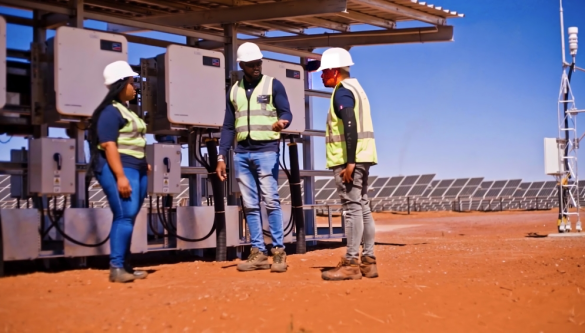187
South Africa’s energy sector marked a significant milestone with the official commissioning of its largest wheeling project. This innovative initiative is set to revolutionize the way electricity is distributed across the country, enhancing efficiency and sustainability in the power supply.
The groundbreaking project, led by renewable energy company Absa Energy, aims to deliver clean, reliable power to various regions through a streamlined transmission process. Wheeling involves transporting electricity from generators to consumers via the existing grid infrastructure, bypassing traditional utilities and allowing for more flexible and direct energy transactions.
The official commissioning ceremony, held in Johannesburg, was attended by key stakeholders, including government officials, industry leaders, and community representatives. The project is expected to generate 100 MW of renewable energy, significantly contributing to South Africa’s energy mix and reducing the reliance on coal-fired power plants.
Absa Energy CEO, Marcus Nkosi, highlighted the importance of the project in addressing the country’s energy challenges. “This wheeling project represents a major step forward in our efforts to transition to a more sustainable energy future. By leveraging existing grid infrastructure, we can deliver clean energy more efficiently and cost-effectively,” Nkosi said.
The wheeling project is poised to benefit numerous sectors, including manufacturing, mining, and agriculture, by providing them with a stable and affordable power supply. This, in turn, is expected to boost economic growth and job creation, particularly in rural areas where access to reliable electricity has been limited.
Government officials have praised the initiative, emphasizing its alignment with South Africa’s broader energy transition goals. The project supports the Integrated Resource Plan (IRP) 2019, which outlines the country’s commitment to increasing the share of renewable energy in its power generation portfolio. Energy Minister Gwede Mantashe expressed optimism about the project’s potential impact. “This is a testament to our dedication to renewable energy and innovation. It will help us meet our climate targets while ensuring energy security for all South Africans,” Mantashe stated.
The wheeling project also underscores the role of public-private partnerships in driving the energy sector’s transformation. Collaboration between the government, private companies, and local communities has been pivotal in bringing this project to fruition. The involvement of financial institutions and investors has ensured adequate funding and support for the initiative.
Environmental advocates have welcomed the project’s focus on renewable energy, noting its potential to significantly reduce carbon emissions and environmental degradation. By harnessing solar and wind power, the wheeling project aligns with global efforts to combat climate change and promote sustainable development.
Looking ahead, Absa Energy plans to expand the wheeling project, aiming to increase its capacity and reach more regions across South Africa. The company is also exploring additional renewable energy sources, such as biomass and hydropower, to diversify its energy portfolio further.
In conclusion, the official commissioning of South Africa’s largest wheeling project marks a pivotal moment in the country’s energy landscape. It highlights the potential of innovative solutions to address pressing energy challenges while promoting sustainability and economic growth. As the project progresses, it offers hope for a cleaner, more efficient, and resilient energy future for South Africa.
Source: Engineeringnews.
The groundbreaking project, led by renewable energy company Absa Energy, aims to deliver clean, reliable power to various regions through a streamlined transmission process. Wheeling involves transporting electricity from generators to consumers via the existing grid infrastructure, bypassing traditional utilities and allowing for more flexible and direct energy transactions.
The official commissioning ceremony, held in Johannesburg, was attended by key stakeholders, including government officials, industry leaders, and community representatives. The project is expected to generate 100 MW of renewable energy, significantly contributing to South Africa’s energy mix and reducing the reliance on coal-fired power plants.
Absa Energy CEO, Marcus Nkosi, highlighted the importance of the project in addressing the country’s energy challenges. “This wheeling project represents a major step forward in our efforts to transition to a more sustainable energy future. By leveraging existing grid infrastructure, we can deliver clean energy more efficiently and cost-effectively,” Nkosi said.
The wheeling project is poised to benefit numerous sectors, including manufacturing, mining, and agriculture, by providing them with a stable and affordable power supply. This, in turn, is expected to boost economic growth and job creation, particularly in rural areas where access to reliable electricity has been limited.
Government officials have praised the initiative, emphasizing its alignment with South Africa’s broader energy transition goals. The project supports the Integrated Resource Plan (IRP) 2019, which outlines the country’s commitment to increasing the share of renewable energy in its power generation portfolio. Energy Minister Gwede Mantashe expressed optimism about the project’s potential impact. “This is a testament to our dedication to renewable energy and innovation. It will help us meet our climate targets while ensuring energy security for all South Africans,” Mantashe stated.
The wheeling project also underscores the role of public-private partnerships in driving the energy sector’s transformation. Collaboration between the government, private companies, and local communities has been pivotal in bringing this project to fruition. The involvement of financial institutions and investors has ensured adequate funding and support for the initiative.
Environmental advocates have welcomed the project’s focus on renewable energy, noting its potential to significantly reduce carbon emissions and environmental degradation. By harnessing solar and wind power, the wheeling project aligns with global efforts to combat climate change and promote sustainable development.
Looking ahead, Absa Energy plans to expand the wheeling project, aiming to increase its capacity and reach more regions across South Africa. The company is also exploring additional renewable energy sources, such as biomass and hydropower, to diversify its energy portfolio further.
In conclusion, the official commissioning of South Africa’s largest wheeling project marks a pivotal moment in the country’s energy landscape. It highlights the potential of innovative solutions to address pressing energy challenges while promoting sustainability and economic growth. As the project progresses, it offers hope for a cleaner, more efficient, and resilient energy future for South Africa.
Source: Engineeringnews.



